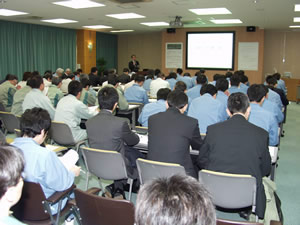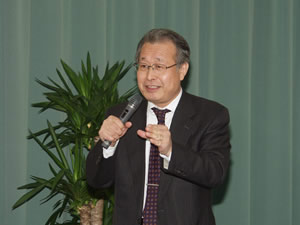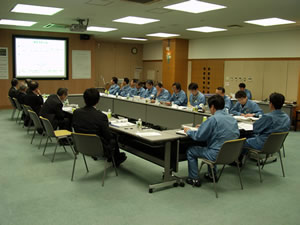|
|
 |
|
|
The 90th Safety Caravan was conducted at the Onagawa Nuclear Power Station of the Tohoku Electric Power Company, Inc. in Onagawa-cho, Oshikagu-gun, and Ishinomaki-shi, Miyagi Prefecture on November 30, 2006. |
| Safety Presentation |

|
|
During the safety presentation
|
Ninety four (94) employees of Tohoku Electric Power Company and affiliated companies attended the Safety Presentation.
The presentation began with a salutation from Mr. Hiroshi Sakuma, Operating Officer of Tohoku Electric Power Company and Station Manager of the Onagawa Nuclear Power Station. "We are grateful to have this Safety Caravan being held here today. On this occasion, having been directed by the Nuclear & Industrial Safety Agency (NISA) to undergo a nuclear power plant quality assurance system comprehensive inspection, 17 items for effective measures to prevent recurrence have been formulated, and we have reported to NISA as well as local authorities. We hope to obtain the understanding that these measures are for the most part proper. Issues that we sensed through this quality assurance system comprehensive inspection are reformation of the consciousness and the way procurement should be managed. Three goals have been established as the renewal of our quality objective, which is one of the countermeasures against recurrence. The first is safety as the top priority, the second is getting into the habit of always asking questions, and the third is communication. We must work to regain the trust of the people in our region, never letting these simple objectives out of our sight, and continue to improve the quality of the power station and operate the station safely and stably.
Through today's Safety Caravan lecture and opinion exchange session, we look forward to moving one step ahead as we at Onagawa Nuclear Power Station move forward in renovating our determination."
After the salutation, JANTI President Michio Ishikawa gave a speech entitled "Top Leadership Seen in Chinese History" to demonstrate the functions of leadership in the flow of history, using the examples of the first Qin Emperor's pressing forward with the system of counties and provinces and the construction of the Great Wall of China, and Jin Ouen .
Following the speech, Professor Emeritus Masaharu Kitamura from Tohoku University gave a lecture entitled "Engineers Responsibilities Toward Society and Ethics." |
Lecture highlights |

|
|
Mr. Masaharu Kitamura
|
Society, engineers, and organizations all interact among one another, and it is no simple matter to maintain a healthy relationship among them. The key to maintaining a sound relationship is society's trust in the behavior standards of the organization, which should be the recognition of trust as the most important factor. People in the nuclear power industry ought to be especially conscious of this importance, even more than any other industry.
Operators of nuclear power facilities are endeavoring earnestly to improve Corporate Social Responsibility (CSR), but among the major corporate scandals that have been in all the headlines recently, some of them involve corporations that had been highly praised for their CSR structures. More specifically, even if progress is made in the creation of CSR structure, unless the engineers have high moral standards, that structure will sooner or later become nothing but an empty shell. If the behavior standards of the organization become separated from its true intentions, the structure will rapidly deteriorate into an empty shell, and this will lead to the destruction of trust between the corporations and society.
In the creation of structures and organizations, we ought to turn our attention toward the influences of each of personal factors, organizational factors, and social factors. In the case of organizations that are able to deal with the situation within their organization, they should continue to do so, and for others who can not, they had better put forth improvements through communication and collaboration with external organizations, whereas for those organizations who can not sustain cooperation with society, it is impossible to continue doing business in a sound manner.
The social circumstances surrounding the nuclear power industry are severe, but it is not as though there were no way out of the situation. We have not yet reached the point where the pathway to the exit is within sight, but first on the agenda is to solve the problems that are manifested in the form of scandals through the behavior of nuclear engineers. In order to achieve this, the personal factors, organizational factors, and social factors must be clearly recognized, and once this is accomplished, it is important to make efforts to maintain working environments where the so-called "can not speak up syndrome and no volition to speak up syndrome" and "standardization of technical aberrations" do not permeate.
Beginning the journey from this point, engineers must perform their duties while maintaining dignity and responsibility, and by putting this into practice, the pathway should gradually become clear. The continuation of earnestly following these practices itself is the responsibility toward society and ethics of engineers in which nuclear technology with high potential plays a role. |
In the questionnaire after the presentation, the following opinions were expressed.
• I was deeply impressed with the theme that "safety" is not a matter to be observed, but rather the aim is to further advance "safety."
•As the topic of "engineer's ethics" is currently a frequently discussed social matter, I was especially able to understand the importance of communication.
• It renewed my sense that "It should be recognized that for corporations and organizations to be recognized as members of society, trust itself is the most important factor" and "starting with intra-organization communication" is the most important thing for each of us as a member of the organization.
•From the standpoint of needing to understand the current situation, I fully agree. I felt that there was a problem, which includes myself, as to being "unable to speak up" and the like.
• I used to think it was the media's fault for giving nuclear energy a bad rap, but today's talks prompted me to want to change my mind and awareness.
• Stand in the other person's shoes. We engineers have a tendency to look toward the outside from our own common angle and with a shared vision, and my determination to avoid this was renewed.
•These and other opinions were voiced. |
Safety information exchange session |

|
|
Safety information exchange session
|
(1) Introduction of endeavors and exchange of opinions
The safety information exchange session was honored by the presence of Mr. Yasuo Horie, Director of the Human Factor Research Center of the Central Research Institute of the Electric Power Industry (CRIEPI) who presented a talk on the topic "Maintaining Effective Safety Measures."
Also, Mr. Aoki, Manager of the Engineering Section at Tohoku Electric Power Company's Onawawa Power Station presented the topic "Results of the Quality Assurance System Comprehensive Inspection." After the presentations, information and opinions were exchanged regarding the above-mentioned activities and endeavors.
(2)Other
JANTI's NS Net Division explained about the Division's information and database about nuclear power safety culture fostering. |
|
|







